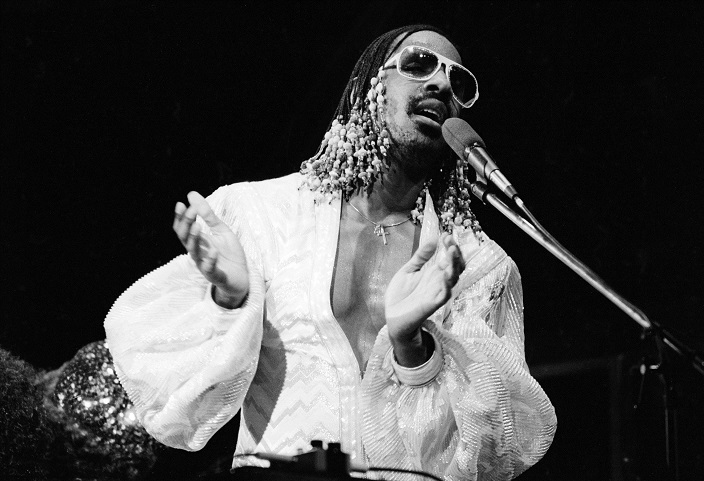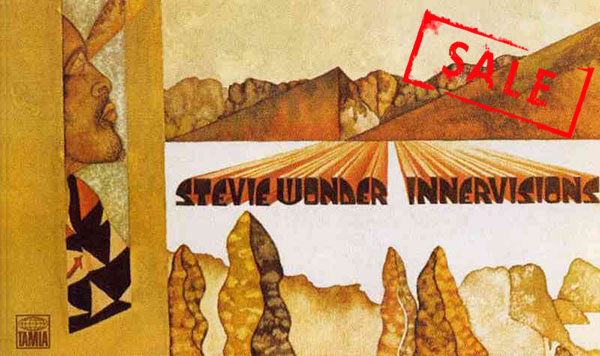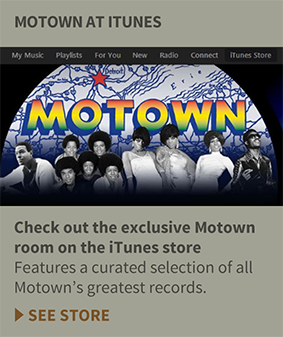Stevie Wonder is among the most celebrated, influential and inspiring musicians of the past half-century. He has set new benchmarks of popularity and artistry throughout his career: the youngest to have a No. 1 album, the first to reach that summit with a live recording, the first American to have an album debut at No. 1, and the only one to receive the Grammy® for Album of the Year for three consecutive releases. It’s little wonder that he has been garlanded at the White House.

FAST FACTS:
- First hit: “Fingertips – Pt. 2”
- Biggest hit: “I Just Called To Say I Love You”
- Top album: Songs In The Key of Life
- Career highlight: Receiving the Presidential Medal of Freedom
STORE OFFERS:
Go check out the Classic Motown store for some great offers on some of Stevie’s catalogue of music, including Innversions and Fulfillingness’ First Finale LPs. Click here to view offers.
KEY INFORMATION:
- Stevland Hardaway Judkins is born in Saginaw, Michigan, on May 13, 1950. A premature baby, he is permanently blinded by an excess of oxygen while in hospital. Growing up, the youngster develops a prodigious talent for playing the drums, harmonica and piano.
- Ron White of the Miracles brings Stevie to audition at Motown. Signed in the summer of 1961, the prodigy is to be known professionally as Little Stevie Wonder. In March 1962, he records his first single, “I Call It Pretty Music But The Old People Call It The Blues.”
- Two albums follow in ’62: The Jazz Soul Of Little Stevie and Tribute To Uncle Ray. A live recording of a track from the first of these, “Fingertips,” is released on Tamla Records as a 45 in May 1963, and explodes onto the pop charts. In August, the single and its accompanying LP, The 12 Year Old Genius Recorded Live, reach No. 1 simultaneously on the Billboard charts.
- Stevie matures, drops the “Little” and at age 15 enjoys his biggest hit since “Fingertips” with 1965’s ‘Uptight (Everything’s Alright),’ a song he co-writes. Over the next four years, he scores seven Top 10 hits, including “I Was Made To Love Her” and “For Once In My Life.”
- With growing confidence, Stevie writes and produces more of his own work, notably 1970’s “Signed, Sealed, Delivered I’m Yours,” as well as a Top 20 hit for the Spinners, “It’s A Shame” His co-writer on both: Syreeta Wright, whom he marries that year. At age 21, Stevie signs a new Motown contract and embarks on an era of self-created albums, driven by new music technology, including the synthesizer.
- An extensive concert tour of North America in 1972, with Stevie opening for the Rolling Stones, broadens his audience as never before, while his Music Of My Mind album reflects these widening creative horizons. In August, he performs with John Lennon and Yoko Ono for the “One to One” charity concert, one of his growing number of philanthropic activities.
- Driven by the hit single “Superstition,” Talking Book is the first of Stevie’s four definitive albums of the 1970s, showcasing the full range of his evolving musicianship. “Superstition” and “You Are The Sunshine Of My Life” are back-to-back No. 1s. A near-fatal auto accident in August 1973 is a temporary setback; Stevie makes a full recovery and is jamming on stage with Elton John in New York within eight weeks.
- After Talking Book comes Innervisions, Fulfillingness’ First Finale and Songs In The Key of Life, which all receive Grammy® awards for Album of the Year. Stevie is the only artist so honored with three consecutive releases. Songs In The Key of Life debuts at No. 1 in October 1976, making him the first American musician with that credit. The album holds the summit for 14 weeks.
- Through the 1970s and ’80s, his songs are recorded by dozens of artists, including B.B. King, Rufus, Aretha Franklin, Minnie Riperton, Ray Charles, George Benson and Michael Jackson. Stevie produces albums for Syreeta, and Jermaine Jackson’s R&B No. 1, “Let’s Get Serious.” He duets with Paul McCartney on another No. 1, 1982’s “Ebony And Ivory.”
- Stevie lends support to the drive to make a national holiday of the late Rev. Martin Luther King’s birthday, leading a 100,000-strong march in Washington, D.C. in 1981. “Happy Birthday” from his Hotter Than July album becomes a signature song for the campaign. It’s also a No. 2 hit in the U.K.
- Alongside performing in concert at home and abroad, Stevie continues to write, record (albeit at a slower pace than before) and receive honors of every kind. In 2005 alone, Detroit declares a “Stevie Wonder Day,” Songs In The Key of Life is certified for 10 million sales, and his new album, A Time To Love, features guest appearances by Paul McCartney, Prince, Hubert Laws, En Vogue and India.Arie.
- In the second decade of the 21st century, Stevie hardly slows down. He takes Songs In The Key of Life on tour, performing the entire album in concert at home and abroad, accruing some of the best reviews of his career. At the White House, he receives America’s highest civilian honor, the Presidential Medal of Freedom, from Barack Obama. In 2017, his datebook ranges from the annual Jazz & Heritage Festival in New Orleans to the private wedding of superstar golfer Rory McIlroy in Ireland – not to mention a midsummer marriage of his own, to Tomeeka Bracy, his third wife.
- During a July 2016 show at London’s Hyde Park, Stevie reminds his audience of issues beyond music. “Choose love over hate,” he says from the stage. “All lives matter.” In Los Angeles the following April, at a music business conference, he repeats the message. “People hating people because of their sexual preference, or the color of their skin or their religion – it’s just ignorance and stupidity.” Then Stevie debuts new music for the industry crowd, a fresh piece of work called “Where Is Our Love Song,” inspired by current events. “We are left with the challenge of getting the world back to the right place,” he declares.






